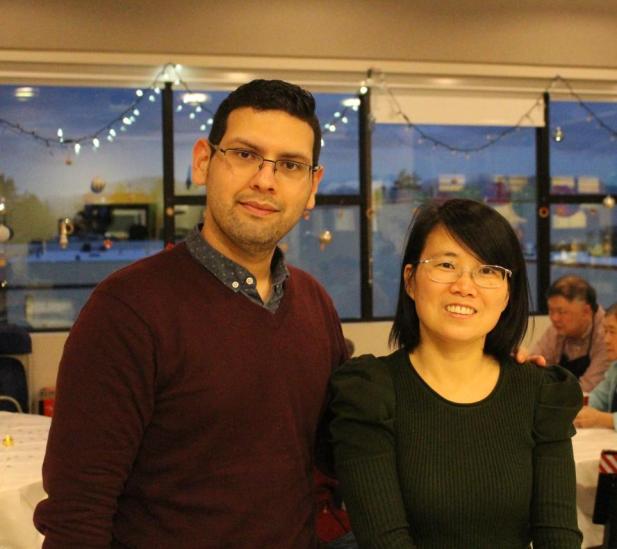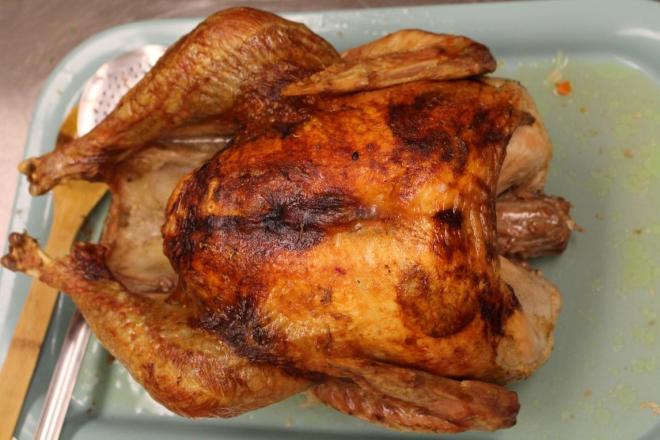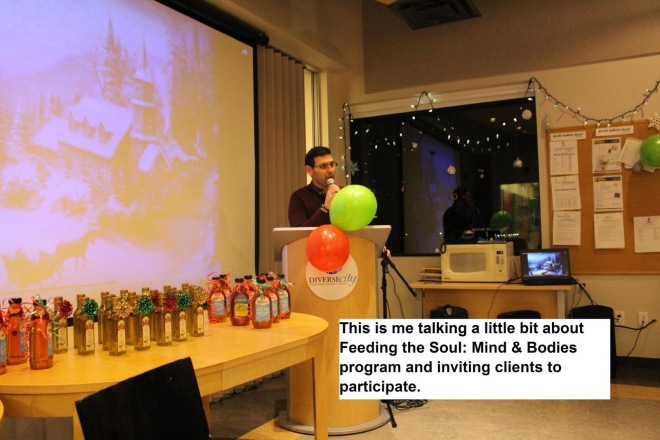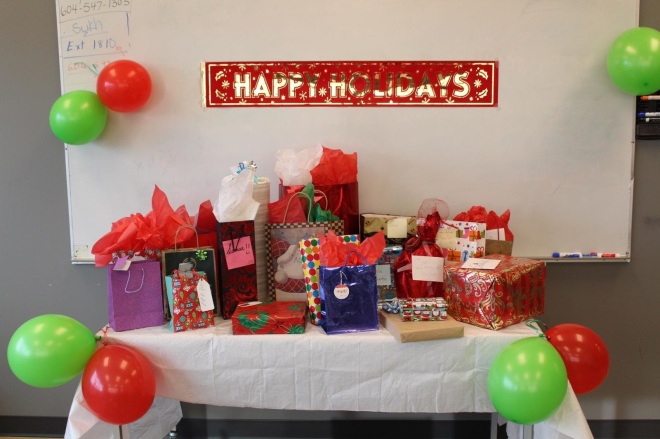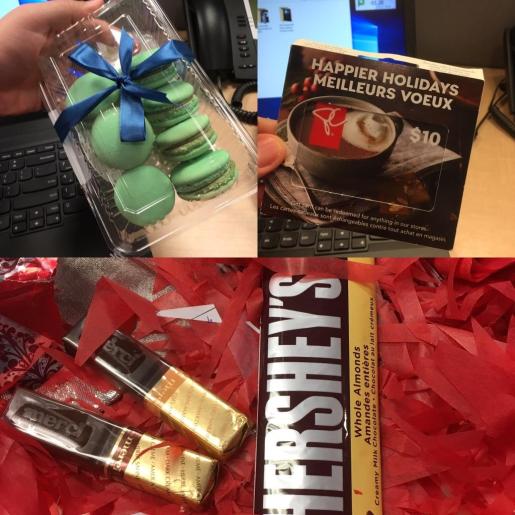 What is your name and role at DIVERSEcity?
What is your name and role at DIVERSEcity?
Chanchal Sidhu, Manager of Multicultural and Community Programs.
I oversee part of the settlement program, the volunteer program, the food security programs, and seniors’ programs and initiatives… plus a few other things 🙂
Can you tell me a bit about your background?
I was born in Canada to Indian immigrants and grew up on a fairly isolated berry and then vegetable farm with primarily Dutch and German neighbours. I had no idea how diverse Canada was until high school!
After university I dove right into the non-profit world with my first job at UNICEF. Since then I have worked at different kinds of non-profits in various roles-often at two places at once since many non-profits only offer part time work. At each place I learned new skills or information which always came in handy later. Only once or twice did I work in a for-profit environment and I was amazed at how simple everything was! Non-profits can be challenging and complex in many ways but I have realized this sector is definitely the right one for me.
I have also done a decent bit of travelling and have worked overseas. I thinking living or working abroad is a great way to learn about yourself, grow, and give you all sorts of new perspectives on things. The skills you develop come in handy in life and in the workplace!
How long have you been working at DIVERSEcity?
4 years as of last October.
What inspired you to work here or why do you do what you do?
I was inspired to take this job because of my husband. He is an immigrant from the former USSR and when he came here it was very (and I mean very) difficult for him. This surprised me. Even though I was aware of how difficult the settlement process is, because my own parents are immigrants and I lived and worked abroad for a time so had a taste of navigating life in a foreign culture/system, seeing someone struggle through that process here in Canada was eye opening. This was especially the case since his barriers were low-medium compared to many other immigrants.
I realized I had taken many things for granted as someone who has always had a very well established ethnic community here and as someone who was born in Canada. All my life I have been gradually exposed to and taught to navigate and understand Canadian systems, norms, and values etc. You do not really realize how ingrained it is until you see someone else trying to understand those things.
I applied for this particular job because I thought I had some good ideas as to how to support newcomers and I wanted to learn more about the sector in general. I find migration and settlement a very interesting topic. I also like how the local work connects to the big picture on the provincial, national, and global level.
How do you spend most of your work time?
My role has changed a lot in the 4 years that I have worked here. I started as one of the Co-Managers of Community Development and then as the Manager of Settlement and Community Programs. I was first covering someone’s maternity leave so there was a lot of program management at a maintenance level which meant problem solving, working with external stakeholders on joint initiatives, making sure targets were met, ensuring the budget was utilized appropriately and that reports were completed. Tahzeem, my boss, told me to expect a lot of work around human resources management. She was right!
Since then, there have been many changes in this sector and in my role, as well as how DIVERSEcity operates. Now, not only do I do the above, but I also get to come up with new program ideas, apply for funding, work on strategic initiatives, and much more. Two days are never alike and there is constant change (which is something I like). I also represent the agency on several committees and but one of my favourite things is helping to make interactions with and working at DIVERSEcity positive. This could be by putting on a staff event with the social committee, suggesting new policies that benefit program participants, taking on summer students or interns who are interested in the work we do, or even keeping the Facebook page up to date.
What advice do you have for newcomer clients?
There is lots of advice I can give! But, the main thing I will highlight here is to really make an effort to try to get involved and become part of the community as this will be home now. This could be as simple as trying to use English. I think eventually most immigrants get their basic issues resolved out of necessity through friends, family, their communities, or agencies like ours, but it can take years before many really feel like they are part of the community or even have a friend. One friend can make a world of difference in a newcomer’s settlement experience and having and building that sense of belonging is important. It can also be easy to stay within one’s neighbourhood or ethnic group but moving beyond that can really illuminate to a newcomer what makes Canada great.
My other advice is to not lose hope. Settlement is a long process and may take years. Many people struggle when they first arrive and contemplate returning home – especially those who do not speak English. Sometimes some encouragement is all that is needed and an agency like DIVERSEcity can help show it is possible to settle successfully. The initial years of struggle may one day be fondly remembered and stories from that time may be told to kids or grandkids! If nothing else, it will probably be a period of personal growth.
What advice do you have for someone interested in working with this population?
As a manager, I am looking for staff who not only have some professional (or volunteer) experience related to the position they are applying for but also those who understand immigration and settlement journeys and experiences. Transferable skills are important and should be highlighted as many of our staff often do not have directly related experience when they first start as this is a very unique area of work. Being able to learn quickly and navigate Canadian systems is important since one never knows what needs clients will have when they come to meet you for the first time. It really can be anything.
For someone interested in being a program manager, I would say the agency is usually looking for those who have some experience in the following three areas: human resources management, program management, and financial management. Beyond that, communication skills, common sense, and flexibility are important. There is constant change in some areas of the agency so a love of change may be ideal for those areas!
What do you find most enjoyable about your work?
I love that I am still learning new things (and developing new skills), that I get to use some of the strengths I think I have to offer, and that the nature of my work is very diverse. No two days or seasons are alike which is one of the reasons I have stayed at DIVERSEcity for four years. I also like having a fair bit of autonomy in my work and that I get the opportunity to get involved in some of the other department or agency-wide initiatives as well.
What are some of the challenges you face at work?
There are so many needs and areas of importance that could use attention. Some are well funded and easy to respond to and there are others that are difficult to bring attention and resources to. Trying to be strategic in deciding where to put energy is challenging for me as I usually want to do it all! I have not said “no” to projects very often while working here but this will not be sustainable and I am trying to learn to be more selective and focused.
What is the best thing about working at DIVERSEcity?
The people! The staff, the managers, the volunteers, the students & interns, and the clients. Everyone has a unique history and something to offer and contribute. I could spend all day every day just talking to people within our walls. I learn so much from these people and am also amazed at how much it is possible to have in common despite having such different backgrounds, languages, cultures, religions, worldviews etc. It’s great to see all our experiences and work come together in one place.
What do you do outside of work or how do you de-stress?
I like organic gardening in the summer (I get lots of tips from Sasikala, our Community Garden Coordinator!), I read fiction almost daily, and I spend time with friends and family. I love animals and travelling when possible. To de-stress I like to have a catch-up session with friends over wine or stay in and watch bad reality tv shows…also with wine 🙂 Pinot noir is my favourite right now.
Which country or city would you like to visit?
All of them. I think every place has something to offer.
However, my husband will finally be a citizen in 2017 so am looking forward to more international trips. Citizenship requirements meant for the last few years he needed to be physically in Canada. The next trip outside of Canada or the US will probably be to somewhere in the Middle East. Other than that, we need to visit my husband’s family in his country and in St. Petersburg, Russia.
Where was your last trip?
Other than the US and Mexico, I last travelled to Turkey & Egypt.
What book are you currently reading or read last?
The book I read last is called Euphoria by Lily King. It is about a pair of married anthropologists in a love triangle studying tribal cultures in New Guinea in the 1930’s. It is inspired by Margaret Mead’s life and touches on competing egos in the marriage. I could not put it down and read it in one day!
What are your pet peeves?
Having hot food in the car. Never ask me to pick up takeout! Not sure why but I can’t stand it.
Has your job affected your lifestyle? Has it changed your outlook on life?
Yes. I appreciate Canada much more. When I was younger and travelling I was always trying to get away from “boring” Canada and was interested in seeing the world. I still am interested in this, of course, but I have developed much deeper feelings of appreciation for and belonging to this great nation.
I have also realized, as silly as it sounds, I am really Canadian! Sometimes it takes exposure to non-Canadians and aspiring Canadians to realize what this means.
Finally, I feel we really are lucky to live here and, though there is always room for improvement, we have a pretty great society. In many ways, what our government does in comparison to some other governments is really remarkable.
What impresses you during an interview or on a resumé?
There are always basic qualifications we look for depending on the position. However, those who can demonstrate that they have taken on challenge or initiative on their own are the ones that impress me the most. Those who can demonstrate through their resumé or interview that they’ve gone above and beyond – illustrated through, for example, volunteering and other things they chose to do with their time or life – is impressive.
I feel that, in the non-profit sector in particular, you need to have enthusiasm and be passionate about your work in order to do a good job. This needs to come from within and is not something someone can provide for you.
If there was one thing you could get the public to understand about the refugee and immigrant population, what would it be?
I think there are many misconceptions about immigrants and refugees that could be addressed. A read through of the public comments section of any immigrant or refugee related news story online illustrates this clearly.
Agencies like ours do a lot of work helping newcomers get oriented to and settled in Canada which is great and very important. However, I think the people who are already here and settled need to think about how we, as Canadians, can be more inclusive and supportive of newcomers in order to better develop and establish the type of society we want. I think we have a larger role in this that is not often promoted or discussed but perhaps should be.
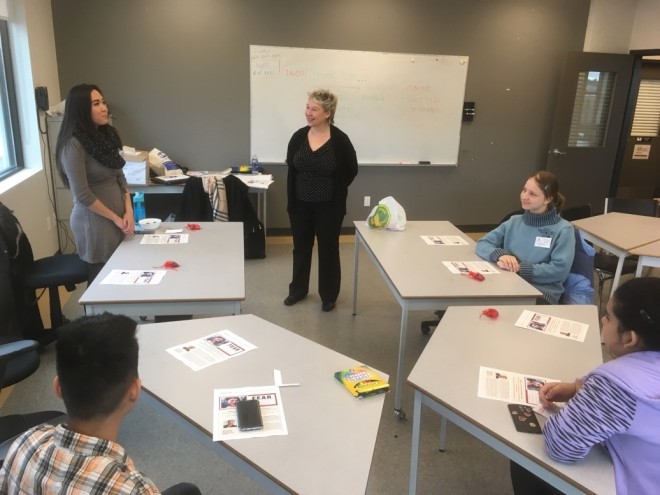
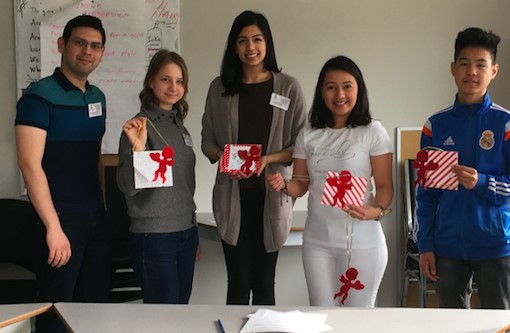
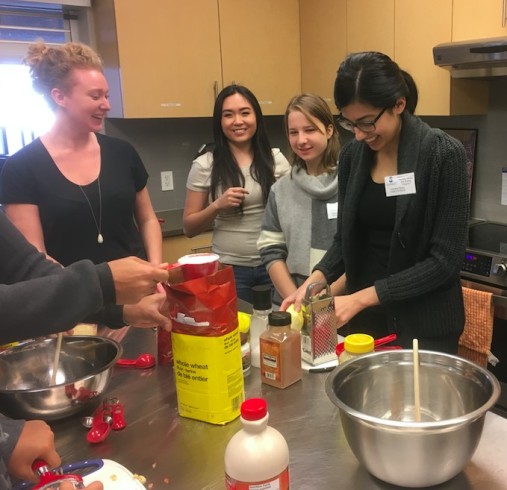

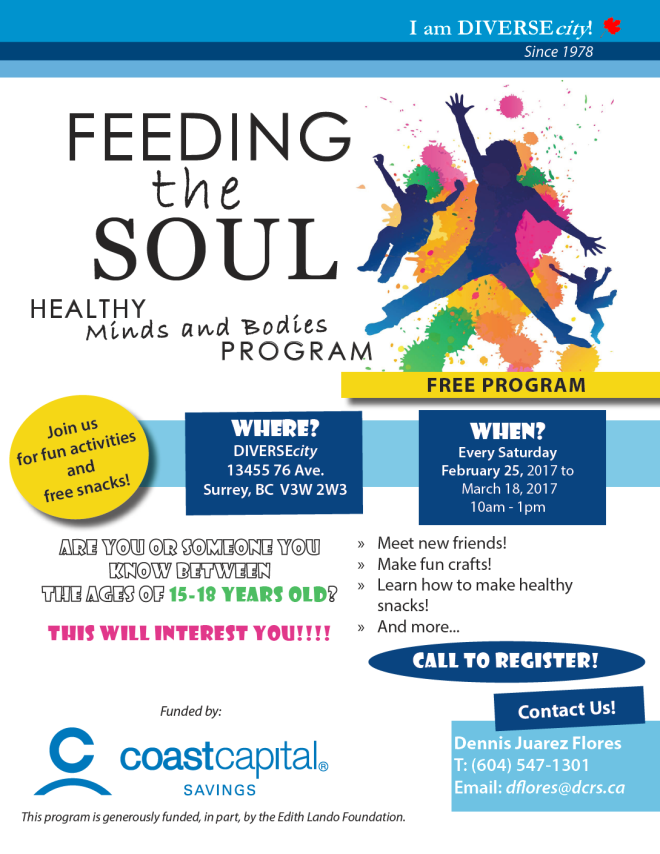





 What is your name and role at DIVERSEcity?
What is your name and role at DIVERSEcity?
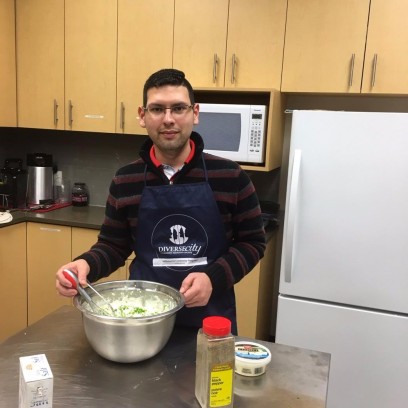 I also love helping with the Community Kitchen Program because I am able to learn new recipes and I also get try the food afterwards. I helped Leo prepare the mashed potatoes once
I also love helping with the Community Kitchen Program because I am able to learn new recipes and I also get try the food afterwards. I helped Leo prepare the mashed potatoes once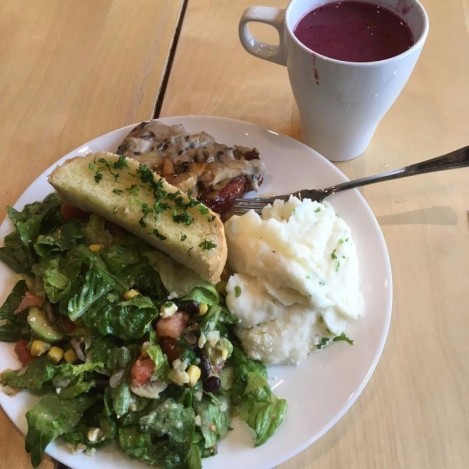
 I also recently went to a settlement session for immigrant support workers on employment related topics at the Surrey Sports & Leisure Centre. They talked about some of the services, requirements and benefits available for newcomers, refugees & permanent resident clients. Some of our neighbour organizations were at the event as well, so it was an excellent time to network and to promote the workshop I’m working on.
I also recently went to a settlement session for immigrant support workers on employment related topics at the Surrey Sports & Leisure Centre. They talked about some of the services, requirements and benefits available for newcomers, refugees & permanent resident clients. Some of our neighbour organizations were at the event as well, so it was an excellent time to network and to promote the workshop I’m working on. I supported Helen with the Food Security, Community Kitchen program. This program provides opportunities for immigrant, refugee and low income families to increase their food security through multicultural cooking groups and community garden activities.
I supported Helen with the Food Security, Community Kitchen program. This program provides opportunities for immigrant, refugee and low income families to increase their food security through multicultural cooking groups and community garden activities.